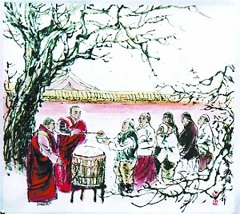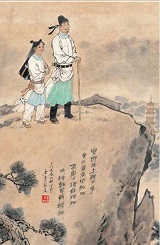Laba Festival - 8th Day of 12th Lunar Month
When is the Chinese Laba Festival? How is it celebrated? What are the traditions?
✍: Guest
 The 8th day of the 12th lunar month is the Laba Festival (Chinese: 腊八节, 臘八節).
The 12th lunar month is the last of month of the year and time for sending out the old year and preparing for the new year.
So ancient Chinese people performs large ceremonies to report to their ancestors of their harvest of the past year.
The 8th day of the 12th lunar month is the Laba Festival (Chinese: 腊八节, 臘八節).
The 12th lunar month is the last of month of the year and time for sending out the old year and preparing for the new year.
So ancient Chinese people performs large ceremonies to report to their ancestors of their harvest of the past year.
The Chinese Laba Festival falls on the following dates in the Gregorian calendar:
| 2026 | January 26 | Monday | 腊八 - Laba Festival |
| 2027 | January 15 | Friday | 腊八 - Laba Festival |
| 2028 | January 4 | Tuesday | 腊八 - Laba Festival |
| 2029 | January 22 | Monday | 腊八 - Laba Festival |
| 2030 | January 11 | Friday | 腊八 - Laba Festival |
Origin
 Before the Qin Dynasty, Laba festival was a celebration of the harvest of the past at the end of calendar year
with large ceremonies to worship ancestor.
Before the Qin Dynasty, Laba festival was a celebration of the harvest of the past at the end of calendar year
with large ceremonies to worship ancestor.
After Buddhism spread to China during the first century AD, the Laba festival was also used as commemoration of Shakyamuni Buddha's enlightenment at the age of 35 on the same date, eighth of 12th lunar month (腊月八日).
Activities
The most important activaty on the Laba Festival is to eat Laba congee, or porridge, (腊八粥) which is made of mixed rice, beans, dried fruit, tofu, potato, meat and vegetables. Sometimes the congee is decorated with coloured sweets or dried fruits.
Buddhist temples held dharma assemblies and chanted prayers in honor of Shakyamuni Buddha to mark the day of Buddha’s Enlightenment. Buddhist temples also prepare Laba porridge and offer it to the devotees and visitors on that day.
 Another Laba food is Laba garlic (腊八蒜), which is a vinegar-preserved garlic.
Its refined color is green and its taste is sour and slightly spicy.
Laba garlic is particularly popular in northern China.
Another Laba food is Laba garlic (腊八蒜), which is a vinegar-preserved garlic.
Its refined color is green and its taste is sour and slightly spicy.
Laba garlic is particularly popular in northern China.
Other traditional activities on the Laba Festival include worshiping ancestors and gods.
2021-05-26, ∼7902🔥, 0💬




